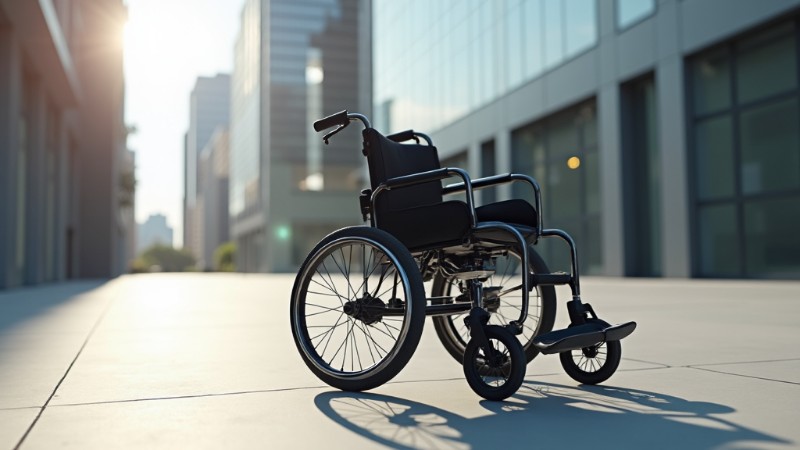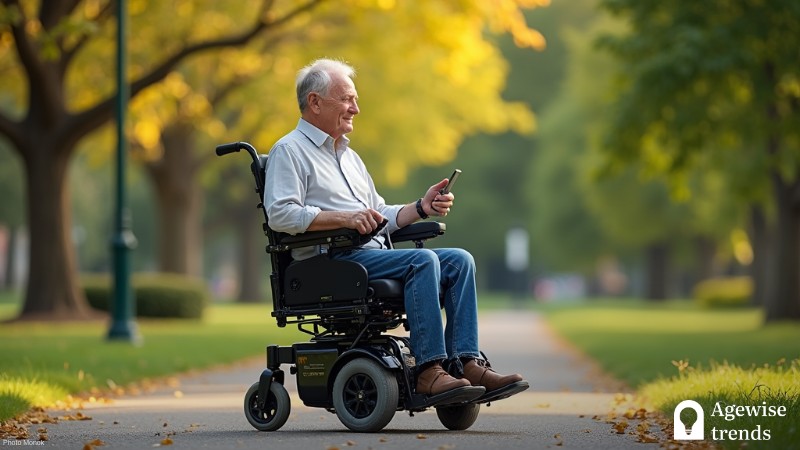In recent years, smart wheelchairs have redefined what mobility means for seniors. By combining traditional support with advanced technology, these innovative devices are making it easier for seniors to maintain independence, stay active, and confidently navigate their surroundings.
With features like obstacle detection, and customizable seating, smart wheelchairs are paving the way for a new era in mobility – one where seniors have the freedom to engage in the activities they love without limitations.
Smart tech meets seniors’ unique needs
As people age, mobility challenges often increase, calling for supportive solutions that enable seniors to stay active and independent. Smart wheelchairs have risen to meet this need.
A key feature of this innovative assistive device is the ability to adapt to the user’s needs. Unlike traditional wheelchairs, which can be hard and challenging to maneuver, smart wheelchairs often come equipped with intuitive features and even autonomous movement. For seniors, these enhancements mean less dependency on others for assistance, allowing them to move freely and navigate their environments with ease.
Many models are also designed with comfort in mind, understanding that seniors may spend extended periods in their mobility devices each day. Unlike standard wheelchairs, they offer customizable seating and improved ergonomic features. Adjustable seat cushions, lumbar support, and armrests can be tailored to meet individual needs, providing a more personalized and comfortable experience.
For seniors with chronic pain or conditions like osteoporosis, having a comfortable, supportive seat can make all the difference in their ability to remain active and engaged. Additionally, some wheelchairs come with shock-absorption mechanisms. This can provide a smoother ride on rough or uneven surfaces, allowing users to traverse grassy areas, gravel paths, or uneven sidewalks comfortably and securely.
Moreover, smart wheelchairs have integrated numerous features to protect users from accidents or falls. One significant development in this area is the inclusion of anti-tip mechanisms, which keep the wheelchair stable on slopes or uneven ground.
Some smart wheelchairs are also equipped with fall detection sensors, which can alert caregivers or family members if a fall occurs. This technology is especially useful in cases where seniors live alone or move independently in large spaces.
In the event of a fall, immediate alerts can be sent to caregivers, ensuring timely assistance. This feature has become increasingly valuable as it not only enhances user safety but also provides peace of mind for family members, knowing that help is available should an emergency arise.
In addition to fall detection, many smart wheelchairs also offer alarm systems that sound when the wheelchair deviates from a set path or approaches unsafe areas, offering further protection. Additionally, many models include automatic braking systems that activate when obstacles are detected, preventing potential collisions and giving seniors the confidence to navigate safely.
For elderly users, who may face reduced physical strength, these technologies make daily tasks easier, helping them regain confidence and independence in their mobility.
An ideal solution for easy portability
Smart folding wheelchairs offer a level of portability that traditional models lack. While some weigh between 50 to 60 pounds, advanced lightweight models often fall within the 30 to 40-pound range, making them much easier to lift, store, and transport. This compact and lightweight design is especially helpful for seniors who may need to store their wheelchair in smaller spaces or transport it frequently in a car or other vehicle.
The folding mechanism is designed to be simple and user-friendly, allowing users or caregivers to collapse the wheelchair quickly with just a few steps. This feature is invaluable for seniors who often travel, visit family, or attend appointments, as it allows them to bring their wheelchair along without hassle.
When folded, these wheelchairs fit easily into car trunks or compact storage spaces. The convenience of a foldable, lightweight design also supports a more independent lifestyle, as seniors don’t need to rely as heavily on others to lift or carry a bulky chair.
For caregivers, the portability of these smart wheelchairs brings significant advantages. A more portable, lightweight wheelchair enables caregivers to assist seniors with less strain. This ease of handling is especially valuable when helping seniors across multiple locations in a single day, making the entire caregiving process less taxing for everyone involved.
The portability of smart, lightweight folding wheelchairs provides both seniors and caregivers with flexibility and peace of mind. These wheelchairs allow seniors to enjoy an active lifestyle, engaging in activities like visiting friends, attending events, or simply going on outings without worrying about the weight or difficulty of managing their wheelchair.
Regional markets embrace senior-friendly solutions
The smart wheelchair market is projected to reach significant milestones by 2034, with industry analysts estimating a market valuation of nearly USD 393.5 million. This growth is largely attributed to a compound annual growth rate (CAGR) of 7.8%, spurred by key trends across multiple regions.
North America holds a dominant market position, largely due to supportive policies such as the Americans with Disabilities Act (ADA), which advocates for mobility aids to improve accessibility for people with disabilities. The U.S. market alone is expected to see a CAGR of 8.3%, driven by a robust healthcare infrastructure and consumer demand for advanced mobility solutions.
Europe is also seeing a strong growth, with Germany in particular showing an average annual growth rate of 7.4%. European nations are making significant investments in healthcare research, focusing on innovations that can support the needs of people with mobility impairments. Governments are increasingly recognizing the importance of providing inclusive solutions for their aging populations, which is reflected in the funding and support available for wheelchair innovation.
Asia-Pacific, on the other hand, is emerging as a high-growth region, primarily fueled by rising healthcare investments and technological adoption in countries like China and India. India’s smart wheelchair industry is projected to achieve an impressive CAGR of 11.4%, thanks to the country’s rapidly aging population and growing awareness of disability inclusion. The increased availability of assistive technologies and rising disposable incomes in the Asia-Pacific region make it a fertile ground for market expansion.
The future of smart wheelchairs for seniors
The growing market for smart wheelchairs represents a powerful shift in how we approach mobility for seniors and individuals with disabilities. These advanced devices are transforming traditional wheelchair models by integrating cutting-edge technology that prioritizes safety, comfort, and independence.
Research has shown that when individuals can engage in social activities and maintain physical autonomy, their mental health improves, contributing to a higher quality of life overall. Smart wheelchairs enable seniors to stay connected with their communities, visit family and friends, and participate in activities that bring joy and fulfillment, thereby improving their mental health and emotional resilience.
As healthcare technology continues to progress, the smart wheelchair industry is poised to evolve with even more adaptive, personalized, and user-friendly solutions. These advancements promise a future where mobility aids are tailored not only to meet the physical needs of users but also to enhance their emotional well-being and social inclusion.
As society places greater emphasis on inclusivity and quality of life for all, smart wheelchairs will continue to evolve, becoming integral tools in empowering seniors to lead lives filled with connection and fulfillment. This trend signifies not only a leap forward in healthcare technology but also a compassionate approach to ensuring that mobility is a right accessible to all.















